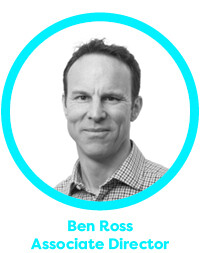Hot topic: how are leading investors in commercial real estate addressing climate change, at scale?

It can be daunting to try to navigate the challenges of climate change as well as the fundamentals of real estate, but doing so (and bringing them together) is now more important than ever.
Sustainability initiatives are seen by savvy investors as differentiators and value creators within certain areas of the market. Many real estate businesses know how to decarbonise at asset level, but struggle when it comes to carbon reduction at scale.
In a recent podcast, BIP.Verco experts Andries van der Walt and Ben Ross discussed best practice and offered advice for large-scale portfolio decarbonisation. You can find a summary of their discussion below.
Is net zero carbon still a key goal for investment managers?
While 2025 to date has been a challenging year from both a political and economic perspective, our strong sense here at BIP.Verco is that European investors have not wavered in their focus. The communication and profile of sustainability initiatives may have reduced but decarbonisation remains centre-stage.
Industry leaders are looking at climate risk and reliance in a holistic way. They are thinking about transition risk, physical risk, regulatory risk and the associated commercial risk as interrelated dimensions of climate resilience. This informs their asset management decisions and investment strategies.
The focus now is on implementation and delivering change on the ground. With 2030 looming, this doesn’t come as a surprise. The combination of technical complexity and affordability to deliver across funds and wider portfolios is the number one challenge in this space.
What does a portfolio-level delivery strategy look like?
There are several strategic approaches for fund and asset managers.
Like-for-like replacements offer incremental improvements but fall short of transformational change. Lifecycle-based upgrades are more proactive, but are often unable to meet standards like CRREM or the UK’s Net Zero Carbon Building Standard (NZCBS). Non-disruptive and commercial value-add solutions (such as installing PV) are an option, but we have found that in the vast majority of instances they are still not enough and won’t align with CRREM or the NZCBS.
Instead, many leading organisations are seeking to be strategic by identifying where the greatest risks and opportunities lie within their portfolios. Auditing plays a central role in this strategy. While some organisations audit every property, most adopt a sampling approach to balance cost and certainty.
It often starts with portfolio modelling, to build an understanding of the order of magnitude and overall requirements. This allows an asset manager to identify assets with poor energy or carbon performance and high costs compared to value. This often evolves into a targeted audit programme to build a more detailed picture.
Common approaches include:
- sampling and extrapolating for consistent property types;
- focusing on strategic assets based on long term hold, deviation from a pathway, value, occupier interest or a combination of these;
- targeting near term opportunities based on property life cycle or lease breaks; or
- conducting technology-led audits like solar PV (though these can miss broader strategic needs).
In practice, most portfolios use a blend of these approaches, guided by accurate operational data. Whichever way you go about it, these approaches build a portfolio view of the opportunities and costs at scale. And when you factor in lease breaks and servicing strategy, you start developing a bottom-up implementation plan and pathway.
The importance of actionable audits
Another lesson learnt over the last couple of years is to make sure audits deliver clear, actionable and technically robust outputs. We see too many that need to be redone as the auditors were focused on what might be possible, rather than actionable recommendations.
It's worth remembering that audits have a shelf life as properties, commercials and technologies evolve. For example, if you are not going to invest within the next 3-5 years, then it may be better to model future potential and prioritise audits on properties that are likely to be moving into implementation. It’s all about taking a very pragmatic approach before commissioning technical auditors.
How does BIP.Verco help with asset management plans?
We support clients with building integrated pathway models, combining deep insight from audits with BIP.Verco’s modelling capability.
The objective is to feed directly into asset management plans, weighing the confidence levels against the interventions. Some will be near-term detailed investment grade capex plans, whereas others will be medium to longer term indicative costs for future capital allocation planning.
We are working with investors and asset managers to put this into practice. We include the costs, timing and savings in plans, then turn these into tender-ready projects and work programmes. We’re helping organisations ensure they have the right processes in place to prioritise interventions and to ensure they meet the three key criteria of technical feasibility, practical deliverability and commercial viability. It is critical to get these right.
Tracking progress
Many organisations still rely on spreadsheets, but struggle with the complexity of modern decarbonisation models and make for a fragmented process. Fortunately, purpose-built tools like BIP.Verco’s MyVerco are now emerging. These enable scenario planning, real-time updates and better decision-making.
We are finding that organisations getting serious about implementation at scale are looking for end-to-end support across this process, from prioritisation, through insight and capex planning, all the way to implementation. Clients are using us in a variety of ways for continuity and to avoid a disjointed approach.
Where can I listen to the podcast?
You can listen to the full podcast here:
How do I find out more about BIP.Verco’s implementation support?
If you’re seeking grounded, real-world support in your net zero transition from audit to action, find out about how our Net Zero Implementation Partner service can help.
BIP.Verco offers a combination of building engineering expertise, net zero experience and strategic thinking to help you turn your plans into reality.
Experts on the topic


